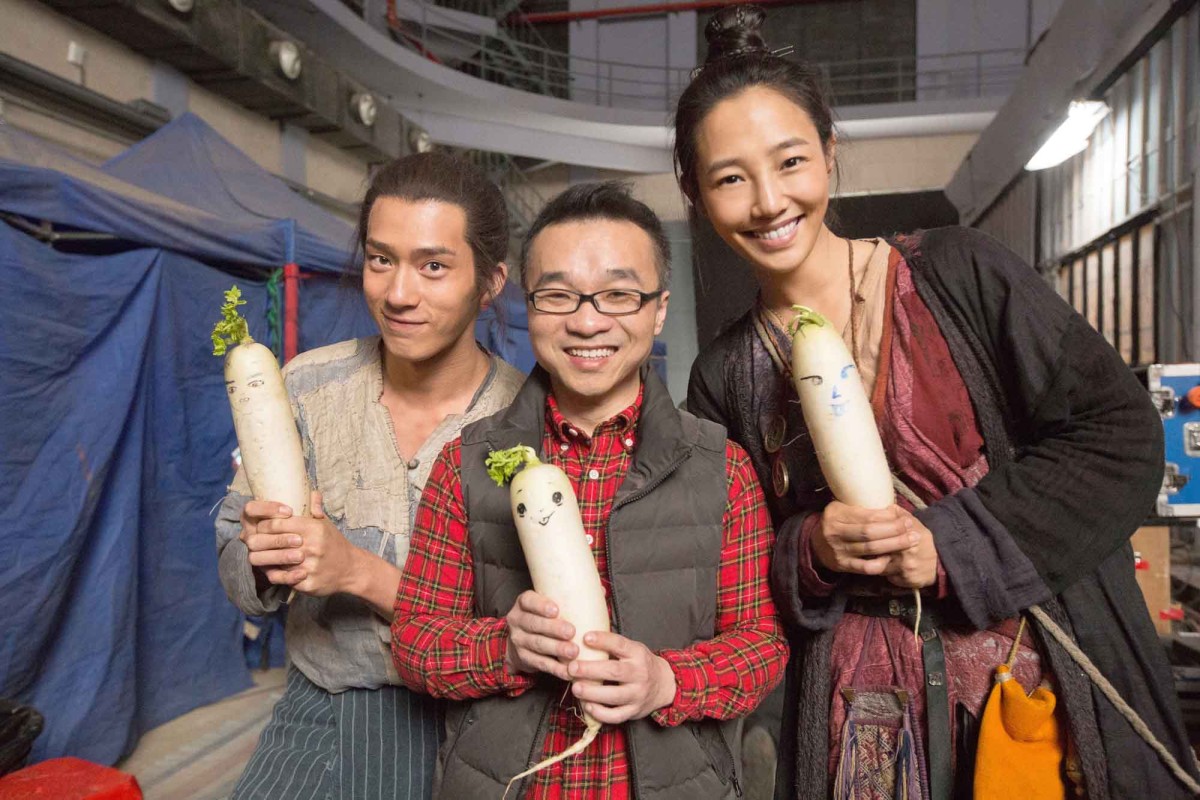
Shrek's father has a new creation: Monster Hunt ... move over, Monsters, Inc!
Animator Raman Hui is talented, funny and eager to inspire others with his success
 (From left) Actor Jing Boran, director Raman Hui and actress Bai Baihe love the monsters in their new film, Monster Hunt.
(From left) Actor Jing Boran, director Raman Hui and actress Bai Baihe love the monsters in their new film, Monster Hunt.Raman Hui Shing-ngai may be in his 50s, but he's still a child in many ways. For one, his eyes sparkle with wonder when discussing his most successful work to date, Shrek 3, which he co-directed with Chris Miller.
Having been the supervising animator for the first two Shrek movies, Hui has been called the "father of Shrek".
"I can move my eyebrows in many different ways," he said at a recent conference at the University of Hong Kong. He demonstrates, wriggling his eyebrows in waves then upwards to give a suspicious stare. While making Shrek, his fellow animators would ask him to move his eyebrows for reference. "Maybe Shrek has some of my eyebrow movements. But I think I look more like Gingerbread Man," he says.
Young Post has to agree. Both Hui and Gingy are tiny in size and cheeky in nature. As he speaks to the students, Hui pokes fun at himself.
"Whenever I was given the chance, I'd give it my best. Some people suggest saving up your creativity for other projects, but if I don't push myself, I'm not going to learn," he says of his journey to becoming one of DreamWorks' top animators. "I try to keep growing, but I'm still this height," he laughs.
Growing up in a single-parent family with two siblings, he didn't have toys. Instead, he had paper and pens. So when he wasn't helping with his mother's beadwork, he would copy what he saw on TV, including Ultraman and Mazinger Z.
He went on to graduate in graphic design in 1984 from Polytechnic University before enrolling on a three-month animation course in Canada in 1988, because it only cost HK$3,000. He never planned to stay abroad, but fell in love with animation and moved to California to become a junior animator for Pacific Data Images, which was later acquired by DreamWorks.
The biggest challenge for Hui at the time was his poor English. When he was presenting his ideas for Antz, he was stopped in mid-sentence. "I couldn't understand a word you said," his boss said. Hui tried again, but his boss shook his head. "Nope, still can't understand." He had to quietly step back, in front of 40 colleagues, while director Tim Johnson, who recently made Home, took over.
Nevertheless, the company recognised his talent and paid for English lessons. Gradually, Hui realised he was beginning to understand jokes in English. Two years later, his boss stopped him again to say "Why has your English become so good?"
Hui says he is lucky to be able to work for DreamWorks because it provided an environment where he could be free of stress and solely focus on his creative work. "You can't be creative when you're nervous," says Hui.
DreamWorks Studios is ranked among the industry's best employers. Hui says the company would pay for them to personalise their office space. One of his colleagues, Hui says, had his office built like a bar.
Hui, who is a horror movie fan, hasn't had enough of ogres and monsters even after working on Shrek for more than a decade. Next month will see the release of his first live action feature film, Monster Hunt.
Based on the supernatural classic Strange Tales of Liaozhai, the US$40 million (=HK$310.1 million) fantasy film has been in the making since 2009 and features Bai Baihe, Jing Boran, Eric Tsang and Sandra Ng, as well as an array of "family-friendly" CGI monsters. Monster Wuba is inspired by a radish, and one scene involves a man becoming pregnant and giving birth.
Filming in live action was a whole new experience for Hui. "It takes an animator a whole day to do one second of footage, so shooting seemed very fast for me," he says. "I was also talking to my actors like I did with my animators. I'd ask them to slow their walk by six seconds, and delay their head turn by six frames. And they'd be like, 'What are you talking about?'" Instead, he had to think of back-stories for his characters so his actors would be able to portray the emotions he wanted.
"I felt insecure all the time," says Hui. "Sometimes [investor] Bill Kong would ask me if I thought my idea was good enough, and I'd say yes, and he'd say [Oscar-winning Taiwanese director] Ang Lee wouldn't think so. So I'd go home and rethink everything."
Making Monster Hunt, Hui struggled to find an animation company that met his standards. "It's not an easy industry to be in, and many animators I know have switched to other jobs," he says. "But one day I hope to make an animation film set in Hong Kong. Even when I was working on Gingerbread Man, I was thinking about making a 'Pineapple Bun Man'. It'd be great if I could do something like Aliens, something that will shock the world and show them something they've never seen before."
A horror film starring Pineapple Bun Man? Hui may sound like he's dreaming, but he's a man who makes dreams come true.
Monster Hunt opens on July 16